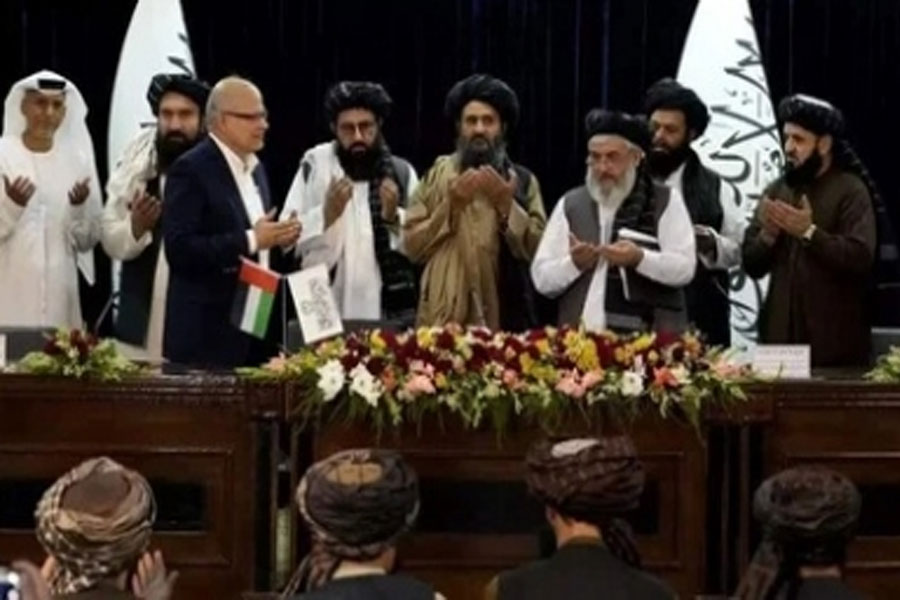International News
Stubborn Taliban (Opinion)

The manner in which the Taliban have been able to retain power in Afghanistan and their latest decisions show that to save millions of Afghanis from impoverishment and death, international community will have to adopt a new approach.
While the nearly one-year old Islamic Emirate of Afghanistan (IEA) government trundles on in the absence of international recognition, financial support and faces international backlash on its mostly anti-women and minorities decisions, reminding one of its earlier harsh tenure, the IEA government has not given up on efforts to cajole the international community whilst trying to engage with its neighbours and regional powers at an equal level.
Afghan Loya Jirga
Last week, a three-day assembly of Islamic clerics and tribal elders, called Loya Jirga, was held in Kabul. The assembly pledged support for the Taliban and called on the international community to recognise the country’s Taliban-led government and freeze its assets.
It is reported that some 70 personalities representing Afghan refugees in Pakistan and 30 others from Iran participated in the Jirga. According to the state-run Bakhtar news agency, about 3,500 religious scholars and elders from across Afghanistan were invited to attend the grand assembly.
Participants of the Jirga were expected to discuss a series of issues, including reopening schools for girls from 7th grade to 12th grade, the type of government, national flag and national anthem.
However, the indications are that the overwhelming majority of attendees were Taliban officials and supporters, mostly Islamic clerics. Women were not allowed to attend, a practice that started during the US-backed government in the past.
The Jirga issued an 11-point statement at the conclusion, urging countries in the region and the world, the UN, Islamic organisations and others to recognise theIEA, remove all sanctions imposed since the Taliban takeover and unfreeze Afghan assets abroad.
The US has frozen nearly $9 billion of Afghanistan’s funds. Reportedly US officials and Taliban Foreign Minister Amir Khan Mutaqqi held talks in Qatar last week to explore ways for unfreezing the money.
It also called for mutual respect and coexistence with neighbouring countries, in the region and the world at large, stressing that “the Afghan soil won’t be used against any country and Afghanistan also won’t allow anyone to interfere in its internal affairs”.
It also supported the administration’s ban on poppy plantation and drug production and its smuggling, noting that poppy cultivation, drug production and its trafficking are against Islamic teachings.
The participants also described the Islamic State terror group as “insurgent, terrorist”, noting cooperation with the group is against Islamic laws. The statement further described them as “Kharijite group of this age that spreads corruption in our Islamic country. Any help or association with them is illegal. And that any armed opposition against the Islamic establishment is a breach of Islamic laws and regarded as rebellion”.
In a surprise development, the reclusive supreme leader and spiritual chief of the Taliban, Haibatullah Akhundzada reached Kabul from his base in southern Kandahar province and addressed the gathering on July 1.
His appearance added symbolic heft to the gathering. In his hour-long speech carried by state radio, Akhundzada called the Taliban takeover of Afghanistan a “victory for the Muslim world”.
The battle for coal
Meanwhile, there are reports that the Taliban have increased the price of Afghan coal from $90 per tonne to $200 per tonne, and set custom duties at 30 per cent, hours after Pakistan Prime Minister Shehbaz Sharif announced import plans for the same. The move is also aimed at rejecting allegations that it’s becoming a “puppet” of Pakistan.
But now, members of the regime are seeking to alter the image of the Taliban’s relationship with the Pakistani government. On June 29, the spokesperson for Afghanistan’s Ministry of Petroleum and Minerals, Mufti Ismatullah Burhan, told The Independent Urdu that no coal trade agreement exists between the two countries, and that the Taliban will use coal as a “pressure point” for Pakistan.
Afghan newspaper Daily Hasht-e Subh also quoted warnings from expert Mirahmad Shakib that the real damage of any accelerated coal imports would not be to either country’s economies but to the environment in Afghanistan. “Pakistan is plundering Afghanistan’s resources in the absence of a responsible national government.” Shakib said.
Since it took over Afghanistan last year and the subsequent economic crisis, the Taliban government has been attempting to rely on natural resources for revenue as an answer to the country’s economic crisis.
The way forward
The Jirga opened in the absence of women representatives and concluded without hinting at reopening schools for girls above grade six and women’s right to work outside home.
In its reaction to the Jirga, Human Rights Watch has said that a decision-making body, such as a Jirga that excludes women and other groups is not legitimate. While human rights advocates claim they do not anticipate and expect significant improvements from the Taliban Jirga in Kabul, Heather Barr, co-director of the Women’s Rights Division at Human Rights Watch, said no one in the Taliban’s Jirga could speak up and that the assembly did not reflected ethnic diversity.
Reportedly, the Taliban elders have been able to keep a complete lock on decision-making since taking over the country last August, and they touted the Jirga as a forum to hear a range of voices on issues facing Afghanistan.
Overall, it appears that Taliban are desperate for the international community to recognise the new Islamic Emirate at the earliest and unfreeze its assets, enabling it to plan for the future.
In its first budget presented in May earlier this year, the IEA government announced a deficit of 44 billion Afghanis ($501 million), the authorities didn’t elaborate or clarified how the gap between expected revenues and planned spending will be met.
The Taliban are under international pressure to be more inclusive as they struggle with Afghanistan’s humanitarian crises. The international community is determined to set its terms while the Taliban are adamant to dictate their own terms for any compromise, as they have been able to control the country for almost a year.
It remains to be seen how it all will pan out as the Taliban are a very stubborn lot and instead of pressure, to find a common ground cajoling and being empathetic will be in favour of both the Afghan people and international community.
(Asad Mirza is a political commentator based in New Delhi. He writes on Muslims, educational, international affairs, interfaith and current affairs)
Crime
As drug net tightens, ISI and D-Syndicate push massive fake currency surge

New Delhi, Dec 10: With the Indian agencies cracking down heavily on the narcotics trade, Intelligence Bureau officials have warned about an uptick in the smuggling of fake currency notes. In the past two weeks, several operations have been carried out in various parts of the country in which fake currency rackets have been busted.
The fake currency mafia is controlled by the Dawood Ibrahim syndicate, which is based in Pakistan. While the syndicate is trying to find newer routes and partners to further the narcotics trade, it is also stepping up operations relating to fake Indian currency. The ISI needs funds to resurrect its terror groups, which were largely beaten down during Operation Sindoor.
The fake currency racket had taken a slight backseat for some years, but now there are full-fledged plans to resume operations on a very large scale. Malda in West Bengal remains the main hub for this racket in India. Now with an unfriendly regime in place in Bangladesh, the ISI sees an opportunity to scale up operations.
All the fake currency that is being printed in Pakistan is first routed into Bangladesh. The ISI finds no problem in routing fake notes into Bangladesh, as Islamabad and Dhaka have close ties today. The sea route has been opened up, and the visa process is much simpler for Pakistanis, and this is being taken advantage of by the ISI.
From Bangladesh, the operatives push the fake currency into Malda, following which it is circulated across the country. Officials report that apart from West Bengal, mini modules have been set up in various parts of the country. The notes are transported either from Malda or Murshidabad in West Bengal to the rest of the country.
An official said there has been an increase in such cases, as the ISI and D-Syndicate are pushing it massively. There is a desperate need for funds as the ISI is not only trying to revive terror groups in Pakistan, but is also creating another front in Bangladesh. It wants to engage India on both fronts, and hence the simultaneous push is being made, the official explained.
These gangs operating the racket in India have been coming up with various ways to push fake notes into the market. In Gujarat, a gang that was running a money-doubling scam was busted. It was found that victims were lured into the scheme, and they were given fake Indian currency. This gang was operating mainly in Gujarat and Maharashtra, the probe has revealed.
While the Bangladesh-West Bengal route is the primary one for this racket, there is also a fresh push to smuggle these notes through the UAE into Kerala. Over the years, Kasargod in Kerala has become a major hub for smuggling fake currency notes.
M.B. Moosa, Abdul Rahman, K.M. Hamza, Kallatra Abdul Ha Khader Haji, Irabhim Soopi, K.S. Abdullah, and Kadavath Atta are the ones who have been running this racket. The notes from Pakistan would reach these persons through the UAE route.
Officials say that the Kerala route is one of the hardest to control. There is a huge rush at the airports owing to the number of people visiting the Gulf nations. The ISI has taken advantage of the stress on the security mechanism at these airports in Kerala. Most of the time, these persons get away because the customs formations are understaffed. This makes checking everyone difficult.
Further, the detection has also become very difficult owing to the quality of the notes that are being printed. An Intelligence Bureau official said that the notes are printed in government printing presses in Lahore, Karachi, Quetta, Multan, and Peshawar. These are the same places where the official Pakistani Rupee is also printed. Hence, the quality of the Indian notes being printed in Pakistan is of very superior quality, and this is making detection a challenge, the officer explained.
The gravity of the problem in India, courtesy this fresh push by Dawood and the ISI, can be seen in a report published by the US State Department. “India faces an increasing inflow of high-quality counterfeit currency, which is produced primarily in Pakistan but smuggled to India through multiple international routes. Criminal networks exchange counterfeit currency for genuine notes, which not only facilitates money laundering but also represents a threat to the Indian economy,” the report says.
Business
India-Russia friendship steady like pole star amid global uncertainty: PM Modi

New Delhi, Dec 5: Hailing India-Russia ties, Prime Minister Narendra Modi on Friday said that the friendship between the two countries has remained like a pole star amidst the ups and downs faced by the world in the past 80 years.
While making a joint press statement with Russian President Vladimir Putin following their talks at the Hyderabad House in New Delhi on Friday, PM Modi said that the ties between two nations have stood the test of time and thanked Putin for his friendship and unwavering commitment to India while recalling the efforts made by the Russian leadership to elevate bilateral ties.
“Today, I am delighted to welcome President Putin to the 23rd India-Russia Summit today. His visit comes at a time when our bilateral relations are experiencing several historic milestones. 25 years back, President Putin laid the foundation for our strategic partnership. 15 years ago, in 2010, our partnership was granted the status of a Special Privileged Strategic Partnership. For the past two and a half decades, he (President Putin) has nurtured this relationship with his leadership and vision.
“His (President Putin) leadership, under all circumstances, has elevated our ties to new heights. I express my heartfelt gratitude to President Putin, my friend, for this deep friendship and unwavering commitment to India. The world has seen many ups and downs over the past eight decades. Humanity has faced many challenges and crises and amidst all this, the India-Russia friendship has remained like a pole star. This relationship, founded on mutual respect and deep trust, has always stood the test of time,” he added.
Recalling recent heinous terror attacks in both countries, PM Modi said that India and Russia have stood together in the fight against terrorism.
“Today we also discussed regional and global issues. India and Russia have long cooperated shoulder to shoulder in the fight against terrorism. Whether it’s the terrorist attack in Pahalgam or the cowardly attack on Crocus City Hall — the root of all these incidents is the same. India firmly believes that terrorism is a direct attack on the values of humanity and global unity against it (terrorism) is our greatest strength.”
PM Modi announced that India and Russia will cooperate to train Indian seafarers in polar waters. “We will now cooperate to train Indian seafarers in polar waters. This will not only strengthen our cooperation in the Arctic, but will also create new employment opportunities for India’s youth.”
Reiterating India’s stance on Ukraine conflict, he said, “India has advocated for peace in Ukraine from the very beginning. We welcome all efforts to find a peaceful and lasting solution to this issue. India has always been ready to contribute and will continue to do so.”
PM Modi also termed energy security as a strong and important pillar of India-Russia partnership. He stated that cooperation between India and Russia in civil nuclear energy has been crucial in realising shared clean energy priorities.
“Energy security has been a strong and important pillar of the India-Russia partnership. Our decades-old cooperation in civil nuclear energy has been crucial in realising our shared clean energy priorities. We will continue this win-win cooperation. Our cooperation in critical minerals is crucial to ensuring secure and diversified supply chains across the world,” stated PM Modi.
Earlier, taking the India-Russia Special and Privileged Partnership ahead, PM Modi warmly welcomed President Putin at the Hyderabad House to participate in the 23rd India-Russia Annual Summit.
With both countries sharing a longstanding and time-tested bond, the two leaders are holding comprehensive and detailed discussions aimed at further strengthening the bilateral relations.
International News
‘Govt follows protocol’: BJP respond after Rahul Gandhi remarks on Oppn-Putin meeting

New Delhi, Dec 4: After Congress MP Rahul Gandhi alleged that the Centre has been advising foreign delegations against meeting or interacting with the Leader of the Opposition (LoP) – a practice he said was followed during previous UPA and NDA regimes, ruling party leaders on Thursday rejected the claim, asserting that the “government follows due protocol” in all matters.
The startling charge by Rahul Gandhi, while speaking to reporters outside Parliament, comes hours ahead of Russian President Vladimir Putin’s two-day visit to India. His remarks are set to raise eyebrows in the political corridors and also set the stage for heated sparring between the BJP and Congress.
Rahul Gandhi said, “Meetings with the LOP take place with delegations coming from outside. It has been a long-held tradition and has always been done this way,” he said, while citing instances during Manmohan Singh and Atal Bihari Vajpayee governments.”
Speaking to Media, BJP MP Kangana Ranaut said, “These decisions are made by the government. Atal ji was a national asset, and the entire country was proud of him. He was a great patriot. I don’t know why Rahul Gandhi is not being allowed, but in my opinion, his commitment to the nation is questionable. His role in creating unrest and trying to divide the country raises doubts about his intentions. And if Rahul Gandhi is comparing himself to Atal ji, then I would suggest he join the BJP — only then could he become like him.”
BJP MP Bhim Singh said, “Why would the government stop him? He only creates chaos and does not speak where he is supposed to speak.”
Echoing a similar stance, BJP MP Brij Lal added, “The government follows protocol, and work will be carried out accordingly. Rahul Gandhi is only making this political.”
JD(U) leader K. C. Tyagi clarified, “The government does not decide such protocols. Visiting heads of state themselves decide whom they wish to meet.”
Union Minister Ramdas Athawale added, “Foreign leaders visit on the invitation of the ruling party or government. If President Putin wishes, Rahul Gandhi, as LoP, can meet him. The government has no role in that.”
-

 Crime3 years ago
Crime3 years agoClass 10 student jumps to death in Jaipur
-

 Maharashtra1 year ago
Maharashtra1 year agoMumbai Local Train Update: Central Railway’s New Timetable Comes Into Effect; Check Full List Of Revised Timings & Stations
-

 Maharashtra1 year ago
Maharashtra1 year agoMumbai To Go Toll-Free Tonight! Maharashtra Govt Announces Complete Toll Waiver For Light Motor Vehicles At All 5 Entry Points Of City
-

 Maharashtra1 year ago
Maharashtra1 year agoFalse photo of Imtiaz Jaleel’s rally, exposing the fooling conspiracy
-

 National News1 year ago
National News1 year agoMinistry of Railways rolls out Special Drive 4.0 with focus on digitisation, cleanliness, inclusiveness and grievance redressal
-

 Maharashtra1 year ago
Maharashtra1 year agoMaharashtra Elections 2024: Mumbai Metro & BEST Services Extended Till Midnight On Voting Day
-

 National News1 year ago
National News1 year agoJ&K: 4 Jawans Killed, 28 Injured After Bus Carrying BSF Personnel For Poll Duty Falls Into Gorge In Budgam; Terrifying Visuals Surface
-

 Crime1 year ago
Crime1 year agoBaba Siddique Murder: Mumbai Police Unable To Get Lawrence Bishnoi Custody Due To Home Ministry Order, Says Report












